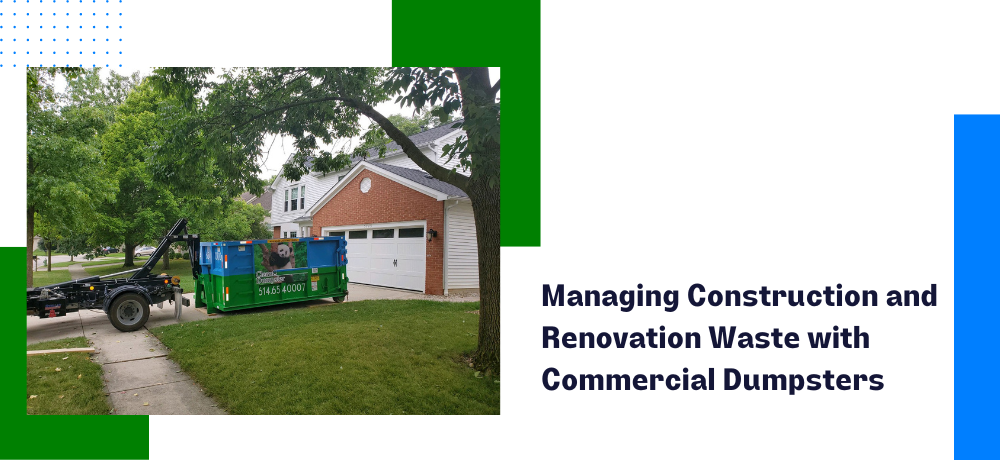
Managing Construction and Renovation Waste with Commercial Dumpsters
- CleanE Dumpster
Construction and renovation projects are exciting, but they also generate a significant amount of waste. Managing this waste efficiently is a logistical challenge and crucial for safety and environmental reasons. CleanE Dumpster is your partner in responsible waste management. In this blog, we'll delve into managing construction and renovation waste with commercial dumpsters, ensuring your project stays organized, safe, and environmentally friendly.
1. Effective Waste Segregation and Recycling in Construction and Renovation Projects with Commercial Dumpsters
One of the fundamental aspects of managing construction and renovation waste with commercial dumpsters is the implementation of an effective waste segregation and recycling program. In such projects, a wide variety of materials, including wood, metal, concrete, drywall, insulation, and potentially hazardous waste, are generated. To minimize the environmental impact and optimize resource utilization, sorting and separating these materials at the source is essential.
Commercial dumpsters can be designated for specific types of waste, ensuring that recyclable materials are diverted from landfills. For example, materials like concrete and asphalt can often be recycled into aggregates for future construction projects, while wood and metal can be repurposed or recycled. Proper waste segregation not only contributes to sustainability but can also result in cost savings by reducing disposal fees for materials that can be recycled.
2. Choosing the Right Size of Commercial Dumpsters for Construction and Renovation Waste
Selecting the appropriate size of commercial dumpsters is a critical decision in waste management for construction and renovation projects. The size of the dumpster should be based on an accurate assessment of the volume and type of waste generated during the project.
Undersized dumpsters can lead to issues such as overflow, which not only creates a messy and unsafe work environment but also results in additional disposal costs and potential delays. On the other hand, choosing overly large dumpsters may lead to wasted resources and unnecessary expenses. Therefore, project managers need to carefully estimate their waste generation and select the right dumpster size to balance efficiency and cost-effectiveness.
3. Scheduled Pickup and Delivery of Commercial Dumpsters for Construction and Renovation Waste
Efficient waste management in construction and renovation projects relies on well-organized scheduling of dumpster pickup and delivery. Regularly scheduled pickups are essential to maintain a clean and safe work environment. When dumpsters are overflowing, it can create hazards for workers and hinder project progress.
Timely waste removal also ensures that the construction or renovation project can continue without interruptions. Delays in waste removal can result in inefficiencies, increased labor costs, and project timeline setbacks. Therefore, coordinating the schedule for dumpster pickup and delivery is crucial for the smooth execution of the project.
4. Safety and Compliance in Handling Construction and Renovation Waste with Commercial Dumpsters
Safety and compliance are paramount when dealing with construction and renovation waste, especially when using commercial dumpsters. Various regulations and safety standards govern the disposal of certain materials, particularly hazardous substances commonly found in renovation projects, such as asbestos and lead-based paint.
Failing to adhere to these regulations can have serious consequences, including legal issues and substantial fines. It's imperative for project managers and contractors to stay informed about local, state, and federal waste disposal regulations and implement safe handling practices. This may involve specialized training for workers and the use of designated commercial dumpsters for hazardous waste.
5. Efficient Cost Management Strategies for Commercial Dumpsters in Construction and Renovation Waste
The management of costs associated with commercial dumpsters in construction and renovation projects is a crucial aspect of project planning. These costs include rental fees for dumpsters, disposal fees, transportation expenses, and potentially recycling costs.
To effectively manage costs, project managers should maintain meticulous records of waste volumes, recycling efforts, and all dumpster-related expenses. Regularly reviewing these records can help identify opportunities for cost reduction and improved efficiency. For instance, optimizing the recycling program can lead to savings in disposal fees, and choosing the right dumpster size can prevent unnecessary rental expenses.
Managing construction and renovation waste doesn't have to be a daunting task. With CleanE Dumpster's commercial dumpsters, you can tackle your project with confidence, knowing that waste disposal is in expert hands. Contact CleanE Dumpster today to explore our commercial dumpster options and make your construction or renovation project a success.
To learn more about the pricing and services we provide, click here. To contact us, please click here or call us at (614)654-0007.
Get in touch with CleanE Dumpster today!
